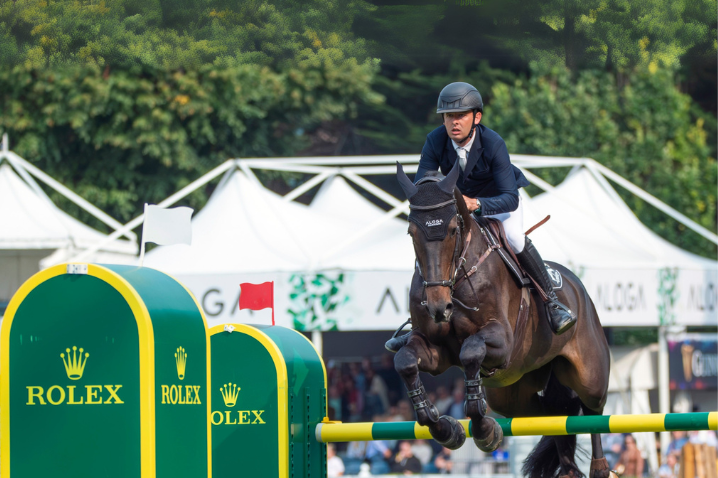New year, new riding goals? January is always a time for planning a new 12 month period and finalising goals we want to achieve both in and out of the saddle.
Whether you aim to compete at a higher level, improve your horse’s fitness, or simply build a stronger bond with your horse, having clear goals will keep you focused and motivated throughout the year. Here’s how to set meaningful goals and achieve them with the help of Aloga Equestrian’s Insider Tips:
Reflect on the Past Year
Team Rider & Co-founder Harry Allen
Before setting goals, take time to evaluate the successes and challenges you have had in the saddle throughout the previous year. What went well? What could have been better? Understanding these factors will help you create realistic and effective goals for the coming year.
Set SMART Goals

Team Rider Cathrine Laudrup-Dufour
Ensure your goals are Specific, Measurable, Achievable, Relevant, and Time-bound. For example:
- Specific: "Improve my horse’s canter transitions."
- Measurable: "Achieve a score of 70% or higher in our next dressage test."
- Achievable: "Compete at one show every month."
- Relevant: Goals that align with your broader ambitions ie. attend training clinic
- Time-bound: "Achieve this by the end of June."
Break Down Big Goals into Smaller Steps

Team Rider Marcus Ehning
Large goals can feel overwhelming. Break them into manageable milestones to maintain momentum. For example, if your goal is to compete in a 1m showjumping class come the spring, start with incorporating weekly exercises to improve rhythm or booking in for regular training sessions to focus on improving accuracy, then practice courses at the desired heights at home before progressing to entering a competition.
Create a Routine

Team Rider Lucy Latta
As well as your horse’s well being, fitness and happiness benefiting from a routine, consistency is key to achieving goals. Develop a realistic training plan that balances work, rest, and variety to keep your horse motivated and engaged. Planning a weekly hack and rest day will help with both fitness and recovery particularly as competitions start back up. Taking time to mark out key competition dates ahead of time can help you work back from that to plan what type of work needs to be done at home or what training clinics might be relevant to attend in the lead up to a specific outing.
Celebrate Milestones

Team Rider Francis Derwin Jr.
Recognizing and rewarding progress, no matter how small, can act as a great motivator. Achieving milestones boosts confidence and motivation, encouraging you to keep moving forward. Making a ‘Milestone List’ can be a great exercise to focus the mind and writing down goals (big or small) acts to reinforce commitment. A ‘Milestone List’ can include areas you want to improve, clinics or events you want to attend, or shows you want to compete at. Writing a list helps to encode & engrain goals to memory, it also feels incredibly satisfying to tick off each milestone as they are achieved. This helps to create a sense of positive progression, develop confidence and acts as a mini celebration in itself.
Stay Adaptable

Team Rider & Co-founder Bertram Allen
Life happens, horses happen. The reality of the sport is not every plan will go perfectly. Be prepared to adjust your goals and timeline as needed, keeping your horse’s well-being and circumstances in mind. Revising your Milestone list on a quarterly basis can help inform you if adjustments need to be made and how your day to day routine is serving in pursuit of your goals.
Seek Support and Inspiration

Surround yourself with like-minded equestrians who can provide encouragement, advice, and fresh ideas. Online communities, training clinics, or a trusted coach can make a big difference. While it can be beneficial to watch and learn from others it is important to avoid too much comparison and be aware that everyone progresses at different paces. Some horses and riders may take longer than others to perfect a technique or you might be surprised with how quickly a youngster takes to a new height class. No one is you and your horse so always remember to stay focused on your own development and try not to get distracted or deterred by what others are doing or posting on social media.
Setting and achieving equestrian goals is a journey of growth for both you and your horse. By reflecting on the past, setting SMART goals, and using the right tools, you’ll be well on your way to a fulfilling and successful year.
What are your equestrian goals for the new year? Let us know in the comments.

